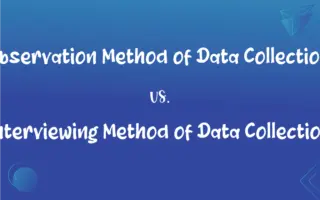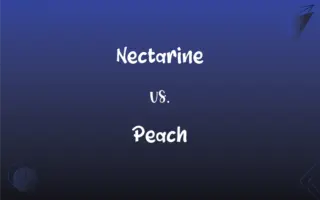HPLC vs. HPTLC: What's the Difference?
Edited by Aimie Carlson || By Harlon Moss || Published on March 11, 2024
HPLC (High-Performance Liquid Chromatography) uses high pressure for compound separation, while HPTLC (High-Performance Thin-Layer Chromatography) involves a thin layer and is less complex.

Key Differences
HPLC (High-Performance Liquid Chromatography) is a technique used for separating the components of a mixture by using high pressure, whereas HPTLC (High-Performance Thin-Layer Chromatography) is a more advanced form of thin-layer chromatography that offers higher efficiency and resolution.
In HPLC, the separation of compounds is achieved under high pressure, leading to faster and more efficient separation. Conversely, HPTLC relies on a thin layer for separation and operates under normal atmospheric pressure.
HPLC utilizes sophisticated instrumentation, including pumps and detectors, making it a more expensive option compared to HPTLC, which is simpler in its setup and operation.
Sample preparation and analysis time in HPLC is generally longer and more complex, whereas HPTLC offers a quicker and more straightforward approach to sample analysis.
The sensitivity and specificity of HPLC are generally higher than those of HPTLC, making HPLC suitable for a wide range of applications, including those requiring detailed analysis.
ADVERTISEMENT
Comparison Chart
Pressure
Uses high pressure for separation
Operates at atmospheric pressure
Complexity
More complex instrumentation
Simpler setup and operation
Cost
Generally more expensive
Less costly
Time Efficiency
Longer preparation and analysis time
Quicker sample preparation and analysis
Application and Specificity
Suitable for a wide range of applications
More limited in application
ADVERTISEMENT
HPLC and HPTLC Definitions
HPLC
HPLC is a chromatographic technique that utilizes high pressure.
HPLC was essential in separating the complex compounds in the medicine.
HPTLC
HPTLC involves the separation of compounds on a thin layer.
The lab conducted HPTLC to analyze the dye components.
HPLC
HPLC is a method for separating substances in a mixture.
The lab used HPLC to analyze the chemical composition of the sample.
HPTLC
HPTLC is a refined version of thin-layer chromatography.
HPTLC was used to quickly identify the plant extracts in the mixture.
HPLC
HPLC is used for purifying chemical substances.
The pharmaceutical company uses HPLC for purifying active drug ingredients.
HPTLC
HPTLC is a cost-effective method for compound separation.
Due to budget constraints, the team opted for HPTLC in their research.
HPLC
HPLC is a high-precision analytical tool in chemistry.
Researchers relied on HPLC for accurate measurement of pollutants.
HPTLC
HPTLC is used for qualitative analysis of mixtures.
HPTLC helped in the preliminary identification of the herbal compounds.
HPLC
HPLC is instrumental in biochemical compound analysis.
HPLC played a crucial role in identifying the proteins in the sample.
HPTLC
HPTLC is a simple, yet effective, chromatographic technique.
For rapid testing, the researchers preferred HPTLC over other methods.
FAQs
What is HPTLC?
HPTLC is an advanced form of thin-layer chromatography for separating compounds on a thin layer.
How does HPLC differ from HPTLC in terms of pressure?
HPLC uses high pressure for separation, while HPTLC operates at atmospheric pressure.
Is HPLC more complex than HPTLC?
Yes, HPLC involves more complex instrumentation compared to HPTLC.
Which is more expensive, HPLC or HPTLC?
HPLC is generally more expensive due to its sophisticated setup.
What is the role of the thin layer in HPTLC?
In HPTLC, the thin layer is the medium on which compounds are separated.
Is HPTLC limited in its applications?
HPTLC has more limited applications compared to HPLC.
Is HPTLC good for qualitative analysis?
Yes, HPTLC is effective for qualitative analysis of mixtures.
What is HPLC?
HPLC is a chromatography technique that uses high pressure to separate substances in a mixture.
Which technique is faster, HPLC or HPTLC?
HPTLC is often faster in terms of sample preparation and analysis.
What industries commonly use HPLC?
HPLC is widely used in pharmaceuticals, environmental testing, and food industry.
Is HPLC more sensitive than HPTLC?
Generally, HPLC is more sensitive and accurate compared to HPTLC.
Does HPLC require skilled operators?
Yes, operating HPLC typically requires more technical skill and training.
Is HPTLC environmentally friendly?
HPTLC is considered more environmentally friendly due to lower solvent usage.
Can HPLC be used for a wide range of applications?
Yes, HPLC is suitable for a wide variety of applications, including detailed analyses.
How does HPLC achieve separation of compounds?
HPLC separates compounds using a liquid solvent under high pressure.
Can HPTLC be automated?
While less common than HPLC, HPTLC can also be automated for certain applications.
Is HPTLC suitable for rapid screening?
Yes, HPTLC is often used for rapid screening due to its faster processing time.
Can both HPLC and HPTLC be used in forensic analysis?
Yes, both HPLC and HPTLC are used in forensic science for analyzing substances.
Can HPLC analyze complex mixtures?
Yes, HPLC is highly effective in analyzing complex mixtures.
Do both HPLC and HPTLC require calibration?
Yes, both techniques require calibration for accurate results.
About Author
Written by
Harlon MossHarlon is a seasoned quality moderator and accomplished content writer for Difference Wiki. An alumnus of the prestigious University of California, he earned his degree in Computer Science. Leveraging his academic background, Harlon brings a meticulous and informed perspective to his work, ensuring content accuracy and excellence.
Edited by
Aimie CarlsonAimie Carlson, holding a master's degree in English literature, is a fervent English language enthusiast. She lends her writing talents to Difference Wiki, a prominent website that specializes in comparisons, offering readers insightful analyses that both captivate and inform.






































































